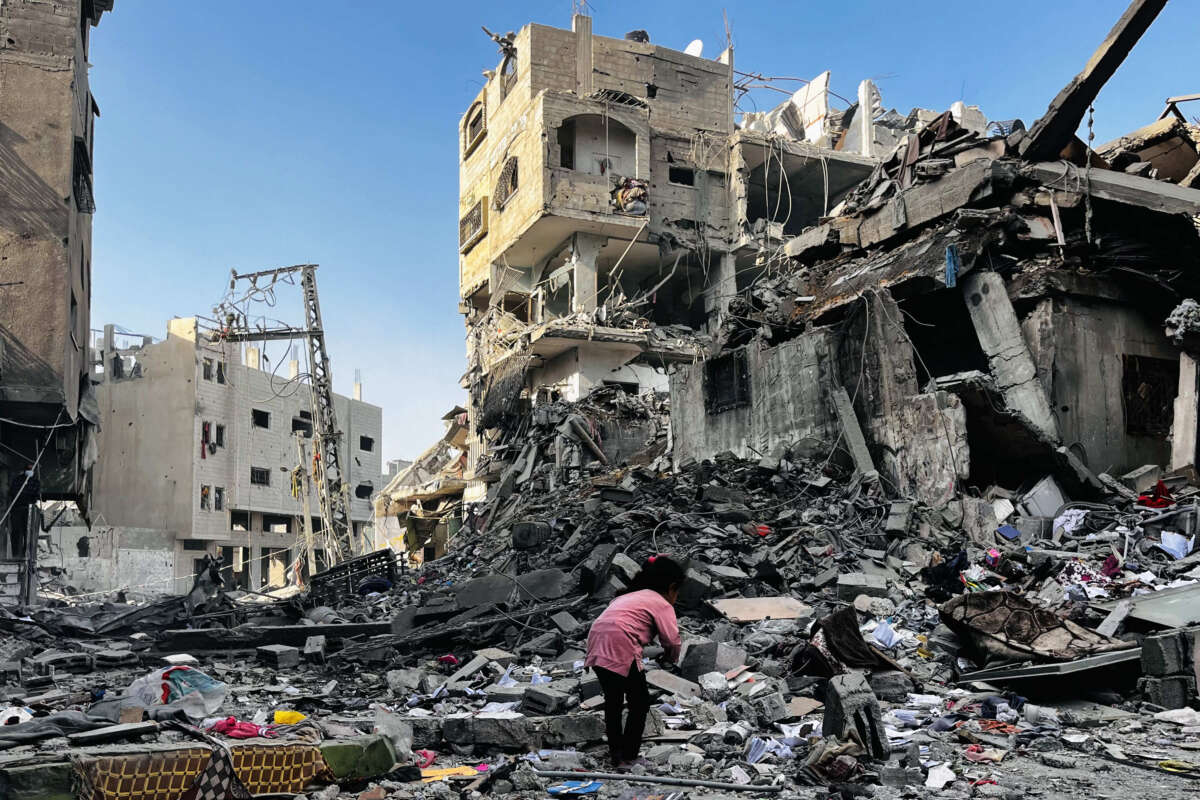Israeli forces on Tuesday bombed a crowded residential building in the northern Gaza town of Beit Lahiya, killing around 93 people — including at least 20 children — in the latest atrocity in a region that has been under heavy military siege for weeks.
Eyewitnesses described an appalling scene at the building decimated by the Israeli strike. One person who was helping to remove victims from the rubble told Reuters that there were “body parts hanging on the walls.” Another eyewitness said that “most of the victims are women and children.”
The Israeli strike on the residential building — which was reportedly sheltering roughly 200 displaced people — also wounded dozens, but hospitals in the region are overwhelmed and barely functional after relentless Israeli raids and attacks, leaving them unable to handle an influx of bombing victims.
Dr. Hussam Abu Safia, the director of nearby Kamal Adwan Hospital, told Al Jazeera that “more than 150 dead and wounded had arrived after the attack.”
“However, he warned that many of those injured may die because of a lack of resources,” the outlet reported. “Israeli forces detained dozens of medical staff at the hospital last week, leaving only three doctors.”
🚨 BREAKING: 93 people, including 25 children, are dead after an Israeli airstrike on a five-story residential building in Beit Lahiya, northern Gaza. At least 150 are injured, with dozens still missing. The Israeli military has yet to comment.
— Drop Site (@DropSiteNews) October 29, 2024
Nearby Kamal Adwan Hospital, down… pic.twitter.com/sLx89aXe4H
Israel’s attack in Beit Lahiya was one of a number of massacres committed in recent days in northern Gaza, where an estimated 100,000 Palestinians are trapped with virtually no access to food, medicine, and other essentials.
“There is nothing. You are talking about tens of days that they are not receiving any supplies,” said Mahmoud Alsaqqa, Oxfam’s food security and livelihood lead in Gaza. Alsaqqa said people are “starving to death” in northern Gaza as Israel impedes humanitarian aid shipments and moves to ban the United Nations’ Palestinian refugee agency.
Dylan Williams, vice president for government affairs at the Center for International Policy, noted Tuesday that “in the last day, Israel passed bills that would block most aid delivery in Gaza and the West Bank and bombed a building sheltering displaced civilians, reportedly killing mostly women and children.”
“Yet [U.S. President Joe] Biden keeps arming Israel counter to U.S. and international law,” Williams wrote on social media.
Internet blackouts in the region, meanwhile, have made it difficult for aid workers and reporters to relay news of northern Gaza’s dire conditions to the world.
“Communication between hospitals, health workers, and aid agencies is becoming sporadic, and ground fighting has made travel increasingly dangerous, making it hard to coordinate care and treatment and accurately collect casualty data,” The Guardian reported Tuesday. “The civil defense service suspended activities last Wednesday after crews were attacked by Israeli forces and tank shelling destroyed their last fire engine.”
Last week, Save the Children decried deadly Israeli attacks on 13 residential buildings in the Jabalia refugee camp and warned that “the threat of attacks and lack of fuel and supplies have left rescue services unable to operate” in the northern part of the Palestinian enclave.
“Attacks by Israeli forces across the Gaza Strip have killed scores of people, including many children and an 11-month-old baby,” said Jeremy Stoner, Save the Children’s regional director. “The attacks have targeted a school-turned-shelter in Nuseirat, Kamal Adwan Hospital, and residential homes in Khan Younis — the very places where children are supposed to be safest, protected under international law.”
“Put simply, those children who have survived so far are running out of time. We are pleading with the international community to urgently intervene,” Stoner added. “Every possible step must be taken to secure a definitive cease-fire and to ensure adherence to international law. Governments must stop fueling the conflict with a supply of weapons and ammunition.”
Médecins Sans Frontières (MSF) staffer Hasan Suboh was among those killed in the wave of Israeli attacks on residential homes in northern Gaza last week, the humanitarian group said in a statement Monday.
“Hasan’s tattered MSF vest, which he wore all the time, was found under the rubble,” the group said. “This vest symbolizes Hasan’s commitment to helping people in distress, but more globally it also symbolizes healthcare and humanitarian assistance.”
“To see it destroyed,” MSF added, “is representative of how in this war, Israel, the U.S. government, and the rest of Israel’s allies have disregarded the protection of healthcare workers, and ripped the rules of war to shreds. The claim that humanitarian workers are protected, that civilian lives are protected, has once again been exposed as a lie for all the world to see.”
Our most important fundraising appeal of the year
December is the most critical time of year for Truthout, because our nonprofit news is funded almost entirely by individual donations from readers like you. So before you navigate away, we ask that you take just a second to support Truthout with a tax-deductible donation.
This year is a little different. We are up against a far-reaching, wide-scale attack on press freedom coming from the Trump administration. 2025 was a year of frightening censorship, news industry corporate consolidation, and worsening financial conditions for progressive nonprofits across the board.
We can only resist Trump’s agenda by cultivating a strong base of support. The right-wing mediasphere is funded comfortably by billionaire owners and venture capitalist philanthropists. At Truthout, we have you.
We’ve set an ambitious target for our year-end campaign — a goal of $250,000 to keep up our fight against authoritarianism in 2026. Please take a meaningful action in this fight: make a one-time or monthly donation to Truthout before December 31. If you have the means, please dig deep.
